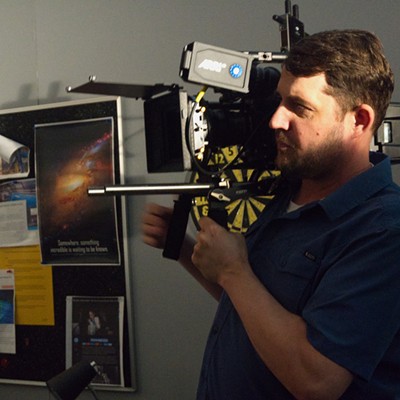The audience is both omniscient and clueless viewing Keith Bunin’s The Credeaux Canvas, a 2001 play now at Ghostlight Theatre Club, under the direction of Emily Etherton. One moment, we possess important information the characters don’t know, and the next moment, they’re springing something new on us.
Set in the world of struggling artists in New York City, Credeaux concerns Winston (Scott Hynes), a fine-arts student and painter; his roommate, Jamie (Jason McKelvy), a former art-school painter who now struggles to eke out a living as a real estate agent; and Jamie’s girlfriend, Amelia (newcomer Ashtyn Anderson), an aspiring singer.
Jamie’s recently deceased father, a big-shot art dealer, has cut his son out of his will. Now, Jamie has stumbled onto an opportunity to defraud Tess (Anna Holloway), one of his dad’s biggest clients.
The eponymous canvas is by an early 20th-century French painter named Jean- Paul Credeaux, whom the art world has just rediscovered. Before long, museumgoers line up around the block to see a retrospective exhibition of his work.
If you’ve been around artists for any length of time, you’ve met someone like the spacey, inarticulately articulate Winston. He’s a second- or third-rate painter, but he paints because he can’t do anything else. This role challenges Hynes, a proven fine actor, because the character has trouble expressing himself.
McKelvy’s Jamie expresses himself too much; he’d be better off keeping his big mouth shut. McKelvy nails the psychological depth of the character. Jamie has problems. He’s a child of privilege who’s experiencing poverty.
Amelia tells Winston she wonders why Jamie considers them to be geniuses, and you can see why she might question his motives. Jamie is a sociopath who cannot operate within the normal strictures of society.
Poor Amelia. She’s fallen in with these needy, dependent people, because she’s that way herself. Anderson does a fine job in a role that would be tough for more experienced actors.
The play is a fairly interesting study in what happens when characters selfishly want to believe something so badly they do things contrary to their best interests.
If you’re a painter, paint. If you’re a singer, sing. If you write for newspapers, write. No one ever said it would be easy.










